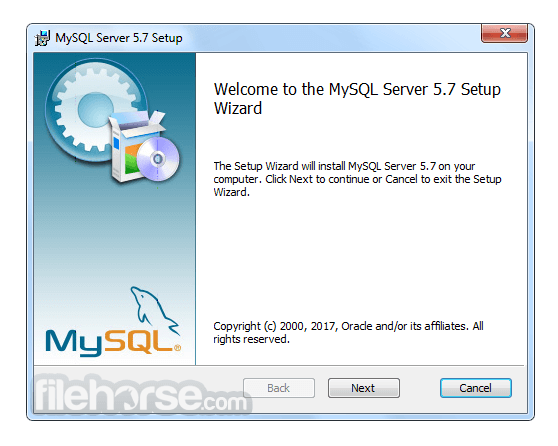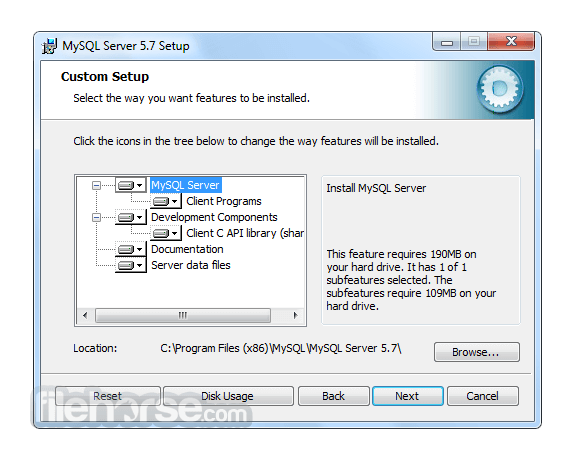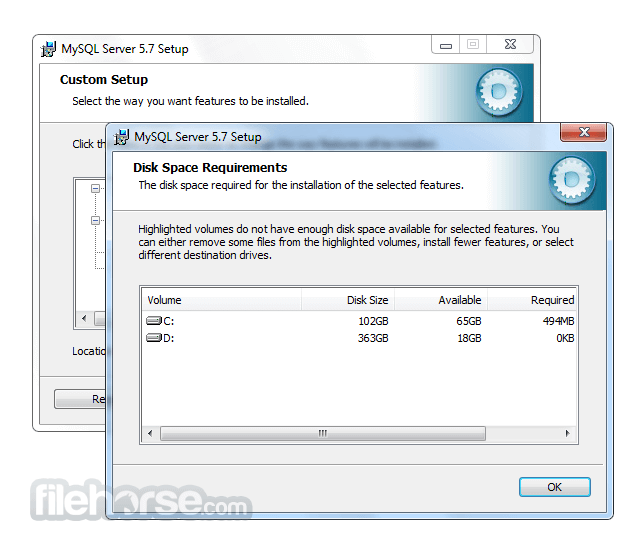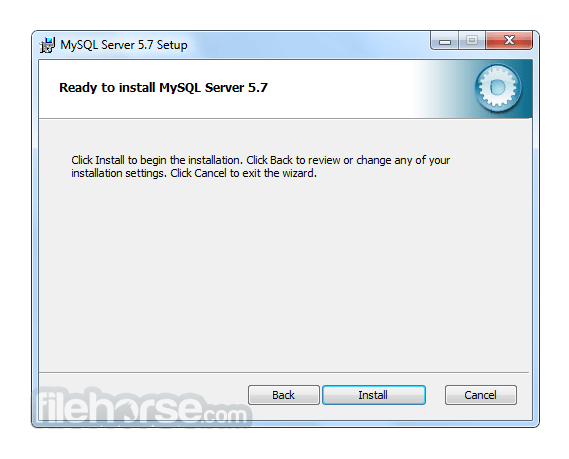-
Latest Version
-
Operating System
Windows XP / Vista / Windows 7 / Windows 8
-
User Rating
Click to vote -
Author / Product
-
Filename
mysql-5.5.41-win32.msi
-
MD5 Checksum
6a3a91c159184379fc37383ef53ff67e
Sometimes latest versions of the software can cause issues when installed on older devices or devices running an older version of the operating system. Software makers usually fix these issues but it can take them some time. What you can do in the meantime is to download and install an older version of MySQL 5.5.41 (32-bit).
For those interested in downloading the most recent release of MySQL or reading our review, simply click here.
All old versions distributed on our website are completely virus-free and available for download at no cost.
We would love to hear from you
If you have any questions or ideas that you want to share with us - head over to our Contact page and let us know. We value your feedback!
What's new in this version:
Functionality Added or Changed:
- The new -DWITH_UBSAN=ON CMake option enables the Undefined Behavior Sanitizer. This feature is supported by GCC 4.9 and up, and Clang 3.4 and up. Bugs Fixed:
- InnoDB: An ALTER TABLE operation raised an assertion. When a foreign key object was removed from the dictionary cache, an incorrect foreign key object was removed from the rb-tree.
- InnoDB: In debug builds, setting the innodb_limit_optimistic_insert_debug debug configuration option to 1 caused an infinite B-tree page split.
- InnoDB: The dict_set_corrupted() function attempted to update the clustered index of the SYS_INDEXES data dictionary table incorrectly.
- InnoDB: A procedure, called from a function to perform an operation on a temporary table, caused the server to halt.
- InnoDB: A CREATE TABLE operation that failed with innodb_strict_mode=ON would succeed without printing a warning with innodb_strict_mode=OFF.
- Replication: When using a MySQL version that had been compiled with the WITH_DEBUG option enabled, using expire_logs_days to purge binary logs caused a restart to crash the server. This problem arose after the fix for Bug #17283409. The fix ensures that current_thd is checked before calling DEBUG_SYNC().
- Replication: A kernel mutex contention was being caused because mysqlbinlog was calling localtime() for every event read, which in turn called stat(/etc/localtime). This fix ensures that mysqlbinlog uses localtime_r(), which is optimized to store the read only timezone internal structure. This also means that mysqlbinlog now establishes the time zone at the beginning of processing and you can not change it during processing. This is the same behavior as MySQL server.
- Replication: The global scope for the sql_log_bin system variable has been deprecated, and this variable can now be set with session scope only. The statement SET GLOBAL SQL_LOG_BIN now produces an error. It remains possible for now to read the global value of sql_log_bin, but you should act to remove from your applications any dependencies on reading this value, as the ability to do so will be removed in a future MySQL release.
- InnoDB permitted a foreign key to be created which referenced a parent table for which the user did not have sufficient privileges.
- On Windows, the replace utility did not work.
- On CentOS 6, specifying a relative path name for the --socket option caused MySQL startup script failure.
- The IS_FREE_LOCK() and IS_USED_LOCK() function implementations contained a race condition due to which they could access freed memory when a user lock was concurrently checked and freed. Accessing freed memory could result in an incorrect function return value or server exit.
- mysql_setpermission failed to properly quote user names in SQL statements that it generated.
 OperaOpera 109.0 Build 5097.68 (64-bit)
OperaOpera 109.0 Build 5097.68 (64-bit) iTop VPNiTop VPN 5.4.0 - Fast, Safe & Secure
iTop VPNiTop VPN 5.4.0 - Fast, Safe & Secure PhotoshopAdobe Photoshop CC 2024 25.7 (64-bit)
PhotoshopAdobe Photoshop CC 2024 25.7 (64-bit) iAnyGoTenorshare iAnyGo 4.0.15
iAnyGoTenorshare iAnyGo 4.0.15 Opera GXOpera GX 109.0.5097.70 (64-bit)
Opera GXOpera GX 109.0.5097.70 (64-bit) Adobe AcrobatAdobe Acrobat Pro 2024.002.20687
Adobe AcrobatAdobe Acrobat Pro 2024.002.20687 BlueStacksBlueStacks - Play on PC 5.21.200
BlueStacksBlueStacks - Play on PC 5.21.200 Hero WarsHero Wars - Online Action Game
Hero WarsHero Wars - Online Action Game Data Recovery4DDiG Windows Data Recovery 9.8.6
Data Recovery4DDiG Windows Data Recovery 9.8.6 TradingViewTradingView - Trusted by 60 Million Traders
TradingViewTradingView - Trusted by 60 Million Traders










Comments and User Reviews